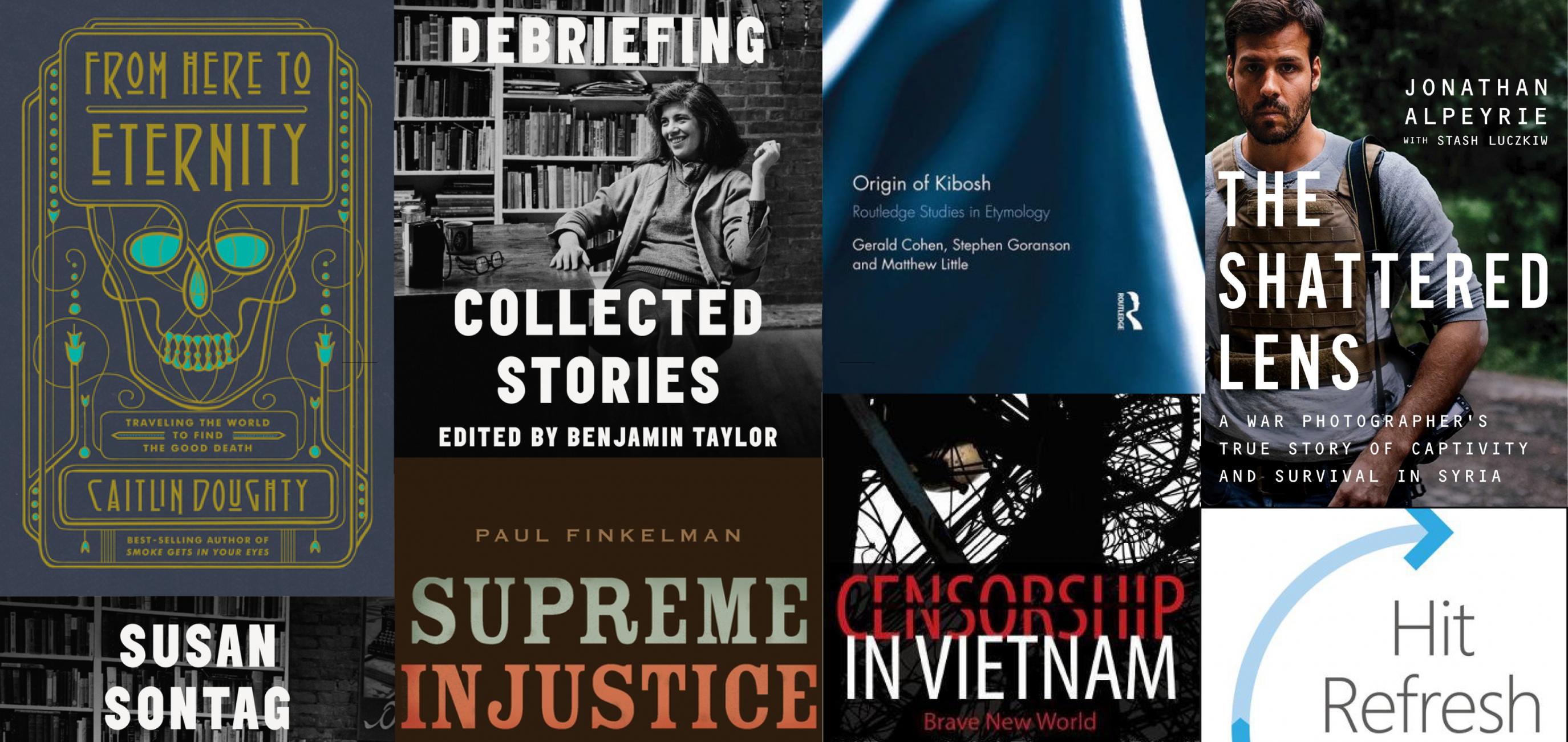
(Collage by Rhonda L. Smith)
The Magazine lists a selection of general interest books, films, and albums by alumni. For additional alumni releases, browse the Magazine’s Goodreads bookshelf.
From Here to Eternity: Traveling the World to Find the Good Death
Caitlin Doughty, AB’12 (Class of 2006)
Americans, argues mortician Caitlin Doughty, are afraid not only of death but also of dead bodies, which they transport as quickly as possible from homes and hospitals into the hands of professionals. In her second book, Doughty compares this practice with more intimate funerary customs around the world: in Japan, families remove their loved one’s bones from cremation ashes with chopsticks and transfer them to an urn; in parts of Indonesia, an embalmed body might remain in the family’s home for several years. By understanding how other cultures experience death, Doughty suggests, we can confront grief and mortality less fearfully and more deeply.
Supreme Injustice: Slavery in the Nation’s Highest Court
Paul Finkelman, AM’72, PhD’76
Why did three influential early Supreme Court justices uphold the legality of slavery in ruling after ruling? Legal historian Paul Finkelman looks at the personal lives and political thought of John Marshall, Roger Taney, and Joseph Story to understand their proslavery positions. Marshall, he reveals, bought and sold slaves, while Taney freed some of his own slaves but opposed granting them constitutional rights. Story, a critic of slavery earlier in his judicial career, ruled against enslaved people who sued for freedom when he served on the nation’s highest court. By tracing how slavery shaped the lives of these three men, Finkelman sheds light on how and why it was protected for so long.
The Shattered Lens: A War Photographer’s True Story of Captivity and Survival in Syria
Jonathan Alpeyrie, AB’03
In April 2013 photojournalist Jonathan Alpeyrie was kidnapped by Syrian rebels while covering the country’s brutal civil war. For the first three weeks of his 81-day captivity, Alpeyrie sat blindfolded and handcuffed, listening to shelling outside the house where he was held. As his imprisonment stretched on, Alpeyrie rediscovered his faith, allowing him to endure an unimaginable trauma and see the humanity in his captors. In this memoir he weighs the personal costs of working in war zones against the importance of documenting them.
Origin of Kibosh
Matthew Little, AM’72, PhD’75
For years etymologists have struggled to determine the origins of the word kibosh. Is it Yiddish? Gaelic? Italian? With no convincing evidence, most dictionaries leave it at “origin unknown.” Matthew Little and his coauthors aim to put the kibosh on the debate, arguing the word derives from kurbash, a type of whip made from hippopotamus or rhinoceros hide and used for torture during the Ottoman Empire.
Censorship in Vietnam: Brave New World
Thomas A. Bass, AB’73
Thomas Bass’s The Spy Who Loved Us, an account of the Vietnamese journalist and double agent Pham Xuan An, was published in 2005. It took another nine years for the book to be released in Vietnam, and when it did come out, the text was heavily redacted. Curious about the lives and work of his censors, Bass flew to Vietnam to meet them in person. Censorship in Vietnam probes the effects of widespread censorship on a country’s sense of its history and culture.
Hit Refresh: The Quest to Rediscover Microsoft’s Soul and Imagine a Better Future For Everyone
Satya Nadella, MBA’97
When Satya Nadella became CEO of Microsoft in 2014, he pledged to transform the iconic company, in part by focusing on its culture. In Hit Refresh he describes the changes under way at Microsoft and the technological breakthroughs on the horizon—among them, artificial intelligence and quantum computing. Nadella also looks back on the experiences that have reshaped his own life, from immigrating to the United States to becoming the father of a son with severe disabilities.
Debriefing: Collected Stories
Susan Sontag, AB’51
The first complete collection of Susan Sontag’s short fiction, Debriefing includes unusually autobiographical pieces alongside more experimental works. In “Pilgrimage” (1987), a story based on Sontag’s meeting with Thomas Mann, the story’s teenage narrator is invited to Mann’s house for tea, only to leave disappointed by the experience. “The Way We Live Now” (1986) captures the anguished early days of the AIDS epidemic in New York, while the Twilight Zone-esque “The Dummy” (1963) imagines a dissatisfied businessman who replaces himself with a clone.
